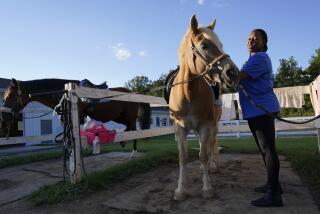War-weary vets get a helping hoof
- Share via
Reporting from Fort Lauderdale, Fla. — After three tours of duty in Iraq, Marine Lance Cpl. Eugene Calonge came home with a feeling common to many veterans scarred by the horrors of war: He didn’t fit in.
“I was always on edge,” the 29-year-old security guard said.
Then, in a paddock at the South Florida Veterans Multi-Purpose Center, he met a horse named Blue.
“I remember walking toward the horses and feeling scared,” said Calonge, who saw heavy fighting in Fallujah. “But pretty quickly I sensed that this horse had my back, just as I had his. And that was comforting.”
Animal-assisted therapy -- with horses, dogs, guinea pigs and even ducks -- is just one of the techniques being used to help veterans diagnosed with post-traumatic stress disorder.
Last month, President Obama signed a law that will provide federal funds to furnish animals, such as physical therapy dogs and guide dogs, to service members wounded in action.
Calonge’s work with Blue took place at the center in Davie, Fla., where therapists Lorisa Lewis and Shelley Green use horses to break down barriers often hard to breach in sterile office settings.
“Guys often come back and feel they can’t trust others,” Lewis said. “Yet horses are vulnerable prey animals, and they are still able to trust. So it’s helpful if veterans can draw those parallels.”
The problems of stress in the military -- and a shortage of mental health counselors -- have been recognized for years. Yet for those on active duty, asking for help can be seen as a sign of weakness. That stigma can carry over to civilian life.
Green, an associate professor of family therapy at Nova Southeastern University, and Lewis said that although horses are instinctively wary, they can present a reassuring sense of calm to equally wary veterans.
That is what Calonge picked up on with Blue.
“In the Marines, we all go around with attitudes,” he said. “So I was approaching people here with that attitude. I think the horse gave me a perspective on how to . . . be more aware of the attitude I’m portraying.”
More to Read
Sign up for Essential California
The most important California stories and recommendations in your inbox every morning.
You may occasionally receive promotional content from the Los Angeles Times.










